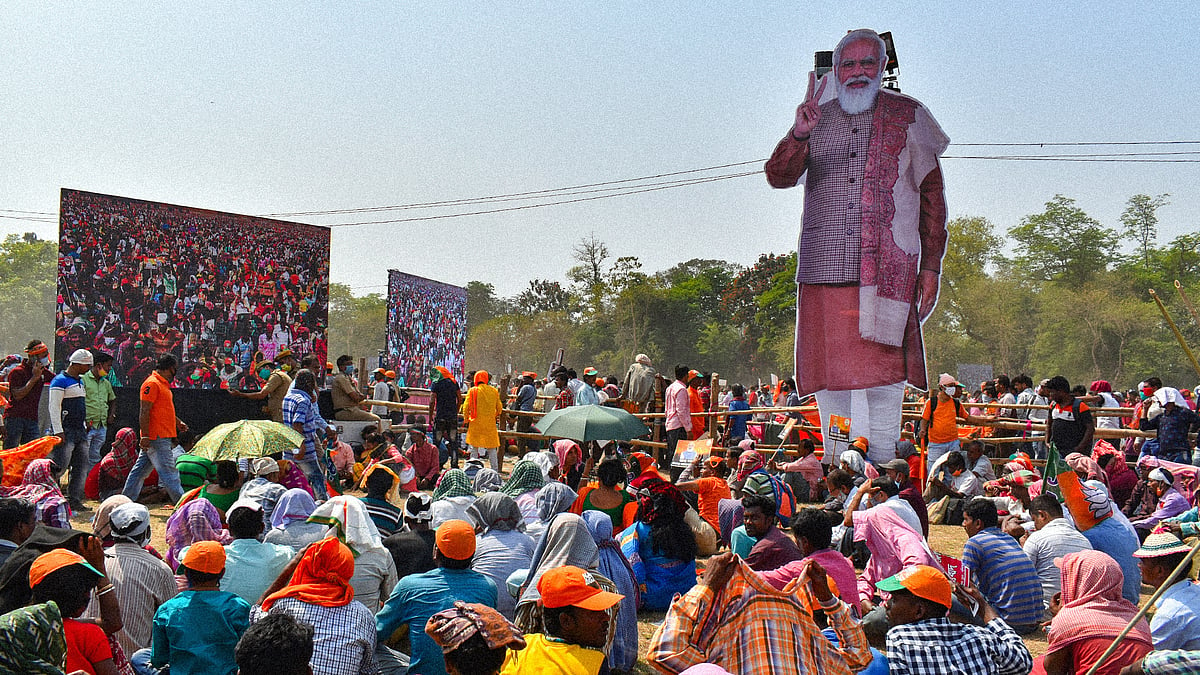How apolitical was the RSS campaign for ‘voter awareness’ in Bengal?
It was as political as can be, notwithstanding the Sangh Parivar’s protestations.
“We have seen the misrule of the Left for 34 years followed by the misrule of the Trinamool Congress for another 10 years,” a college student said. “Vote against them and defeat them. Defeat those who tortured us for the past 10 years.”
The student was delivering a speech during a public meeting of the Akhil Bharatiya Vidyarthi Parishad, the student wing of the Rashtriya Swayamsevak Sangh. She herself was a member of the ABVP in Bagati Sreegopal Banerjee College in Hooghly district’s Mogha. The ABVP, which claims to be non-political, organised the meeting two days before the local assembly seat of Saptagram went to the polls on April 10.
A day later, a similar meeting was organised on a street in Purbasthali in Burdwan district. Here, Nipen Mallick, a leader of the Bharatiya Mazdoor Sangh, the RSS’s labour wing, told those gathered that the meeting was “of those who have been trampled and deprived by the state government for 44 years”.
“Starting with the Congress rule and followed by the atrocious rule of the Left and the TMC...the parties that ruled Bengal did not speak for India,” Mallick said. “They spoke of secularism and discrimination.”
In Nadia district’s Nabadwip, a town known for its Iskcon temple, VHP posters urged the public to “not bring danger to your door by voting for the appeasers”. The VHP’s youth wing, Bajrang Dal, had its own posters nearby asking people to “vote for the nationalist force to save Nabadwip’s females from ‘love jihad’”.
In all three cases, the meetings and posters stemmed from organisations affiliated with the RSS, the BJP’s parent organisation. This despite the RSS consistently claiming to be a cultural organisation that engages in social work and not in political activities.
“RSS never keeps any remote control to perform any role in politics and government,” RSS spokesperson Ram Madhav had said in 2014. “Sangh is not a political organisation but a social one.”
Even in 2020, RSS sarsanghchalak Mohan Bhagwat – described as the organisation’s “most political head” – said the RSS had no connection with politics.
Affiliates like the ABVP have also claimed to not be political; so has the VHP and the BMS. This article published by Vishwa Samvad Kendra, the media wing of the RSS, said, “The non-political nature of BMS has now gained currency and has become acceptable not only in India but also abroad.”
Yet since the BJP government came to power at the centre in 2014, the organisation has carried out extensive campaigns ahead of elections. While its role is ostensibly to “create awareness to ensure 100 percent voting”, its actions speak otherwise.
But have its “awareness” campaigns in Bengal been apolitical?
No.
Not political, yet political
In RSS parlance, its election awareness programme is called Jagran.
“The campaign consists of three aspects: requesting people to ensure 100 percent turnout, to vote for a candidate instead of NOTA, and to keep important issues in mind while using their votes,” said Biplab Roy, the spokesperson of the organisation’s South Bengal chapter. This is predominantly done through RSS volunteers meeting with groups of people.
“We don’t seek votes for any particular party,” Roy added. “We remind the people of the main issues.” These issues are, according to him, the decline in the state’s socioeconomic parameters since Independence, the problem of “infiltration”, and the lack of democratic space.
Of course, these are also the issues raised over and over again by senior BJP leaders, including Narendra Modi and Amit Shah.
A senior RSS functionary in Bengal said over 5,000 RSS volunteers actively participated in the Jagran campaign in the state. The volunteers were associated with “more than two dozen organisations”, he said, and the RSS appointed a “Jagran in-charge” in every district and assembly constituency.
The Sachetan Nagarik Mancha is the RSS’s dedicated wing to oversee this process, and recently released an audio clip calling for a change in state government to build an “atmanirbhar West Bengal”.
Each campaign is planned down to every detail. In Chinsurah town in Hooghly, for instance, teams divided their meetings with voters based on polling booths.
“Every polling booth has around 1,000-1,200 voters. The plan was to hold five group meetings in each booth with 20 voters in each meeting,” an RSS volunteer in Chinsurah explained. “This would help us reach at least 400 voters per booth...In most parts of the constituency, this target was achieved.” These meetings took place ahead of the polls.
Volunteers also distributed a four-page pamphlet which did not bear the RSS’s name or insignia; instead, it was published under the name of Ashis Bhattacharya, an RSS volunteer in Hooghly’s Sheoraphuli. The second half of the fourth page mentioned 100 percent polling, vote early, do not press NOTA.
The rest of the pamphlet was devoted to the “issues” facing Bengal: infiltration, minority appeasement, the TMC’s objection to “Jai Shri Ram”, the “Arabisation” of Bengali, the need for the Citizenship Amendment Act, the deprivation of backward Hindu castes at the cost of pleasing Muslims.
On the ground, the ABVP is the most visible wing of the RSS, campaigning across towns and rural belts.
“Due to policy blunders during the Left front regime, Bengaluru moved ahead but Kolkata did not,” said an ABVP activist during a street meeting in Cooch Behar on April 8. “Kolkata is now lagging 40 years behind...We will establish a nationalist force in Bengal. Think of your children and vote for the nationalist force.”
During group meetings in constituencies across the state, voters were also given free copies of Swastika magazine, the RSS’s mouthpiece in Bengali.
 Can’t deny link between Bengal Covid surge and election rallies, says epidemiologist
Can’t deny link between Bengal Covid surge and election rallies, says epidemiologist